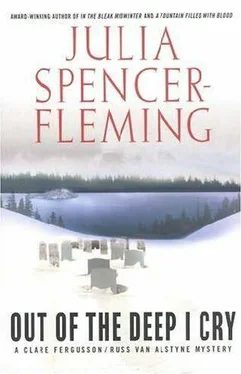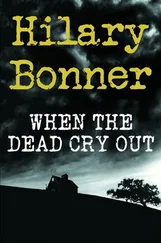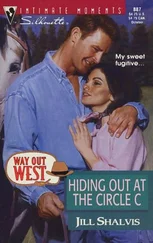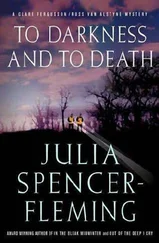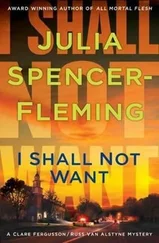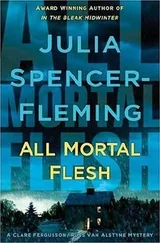Clare reached out and rested her hand on Mrs. Marshall’s thin arm. It felt like bird bones wound in wool. “I’m so sorry. Is that how she died?”
“No, surprisingly; she lived to be seventy-four years old. She was finally taken by pneumonia. Allan Rouse was her doctor, at the end.” She smiled again, that small, sad smile. “He was her protégé.”
And now he had gone missing, after a last visit to the graves of Jane Ketchem’s long-lost children. “Can you think of any reason why he would have taken Debba Clow to see your brothers’ and sisters’ grave site?”
“She’s the woman who’s been protesting against vaccinations, isn’t she?”
“Yes.”
“Then I suspect he was hoping what happened to my family would be an object lesson to her. According to my grandma, the children died because my parents wouldn’t have them vaccinated.”
“You’re kidding me.” Clare touched her mouth. “Excuse me, that sounded flippant, and I didn’t mean to be. I guess I meant, it’s hard to imagine.”
“Well, the diphtheria vaccination was quite new then, and not widely used. My grandma never blamed my parents. She said lots of folks in those days worried that the vaccinations themselves were the cause of a growing list of ills, everything from mental retardation to social diseases.” She cracked another egg and tossed the shell. “And, too, folks living a clean, healthy life out on a farm didn’t think they were likely to have to face the diphtheria. It was supposed to be a disease of the slums, passed around by poor unwashed immigrants.” Mrs. Marshall gave Clare a dry look. “You’ll recognize that line of reasoning. It seems human nature doesn’t change, just the name of the disease.”
“Do you think your parents blamed themselves?”
“I’m sure of it. They made what they must have thought was a good decision, in the best interests of their children, and they lost everything.” Mrs. Marshall rested her hands on either side of the metal mixing bowl, cupping it abstractedly as she looked out the window again. “I believe that’s the real reason I never had children.”
Clare must have made some involuntary gesture, because Mrs. Marshall turned to her.
“Oh, yes, it was a choice. People assumed Henry and I simply weren’t fortunate, but we knew before we got married that neither of us intended to have children. In fact, I turned down two men who asked me first, because I knew they wanted their own families one day. But thinking about it”-she paused, worrying her lip so that a tiny smudge of marigold appeared on one of her front teeth-“I see that it wasn’t the fear of what losing a child would do to me. I mean, that was always there, but… I think it was a fear of the responsibility. My parents took on that responsibility, and in the end, it destroyed them.”
“What happened to your father?”
“Well, you see, that’s why people are going to start repeating the old stories. Now that Allan Rouse has suddenly gone missing. My father walked out of our house the night of April first, 1930, after having a fight with my mother. He climbed into his car, drove away”-Mrs. Marshall sighed and turned to Clare-“and was never seen again.”
THEN
Tuesday, April 1, 1930
By the time he headed out to Lake George to talk with Jonathon Ketchem’s brother, Harry McNeil was beginning to think that Mrs. Ketchem was right about not seeing her husband again.
He had started with Ketchem’s buddies, four names on the top of the list. His first call was pretty much a bust. He had scarcely descended from the Ford when Hutch Shaw’s wife, washing the windows at the front of their narrow row house, yelled, “He’s not here!” What followed was mostly a waterfall of complaints about how the economy had forced her husband into working for a road crew building up past Warrensburg, and now every day he had to travel all the way to Warrensburg, for heaven’s sake, and what kind of life was that for a man with children?
The two useful pieces of information Harry winkled out of Mrs. Shaw before escaping were that neither she nor her husband had spoken with Jonathon Ketchem since Friday before last, and that all the men Mrs. Ketchem had listed were members of the Grange and the VFW.
“So you two were in the Great War together?” he asked Arent De Grave, a blocky blond whose good-sized farm seemed unthreatened by the hard times that had sent poor Hutch Shaw up to Warrensburg.
“Ayup,” Arent said, pitching a forkful of rotted manure onto his spreader. They were standing in the cobbled yard between De Grave’s two barns, and except for the pile of crumbling manure that had been composting over the winter, everything was clean enough to eat off of, in that particularly Dutch way Harry always admired but could never achieve.
Arent continued, “That is, we were both in it. I was in Dordogne. Jon sat the whole thing out in Fort Knox, running their motor pool.”
“So you knew him before the war?”
De Grave tossed another forkful into the already heavily loaded spreader and then swept his hand past his tidy white house, past the firepond, to a notch between two hills where a many-gabled roof could be seen. “That’s the Ketchem place. My family’s been farming next door since my dad moved us from North Cossayuharie in aught-six.”
“They there? Mr. and Mrs. Ketchem?”
De Grave shook his head. “They’ve got hired hands running the place over winter. Mr. Ketchem’s been having a bad time of it with his lungs, so they went out west for the winter. I imagine they’ll be coming back right soon, but they ain’t home yet.”
“Is anyone living in the house?”
“Nope. The hands that ain’t married have their own place, back along the crick.” He paused for a moment. “You’re thinking Jon might have gone to his parents’ house. I would have seen a light there if anyone had been inside the last two nights. Besides, I can’t imagine Jon running back to his mom and pop. That’s the last thing he’d do.”
“So you know him pretty well.”
“As well as anyone, I reckon.”
Harry kicked a clump of hay-studded manure out of his way. “Tell me true now. Is he likely to be off on a bender?”
Arent De Grave rested his pitchfork against the cobbled stones and looked at Harry. “Now where would he be getting booze around here, Chief?”
Harry sighed. “I’m not asking where anybody’s getting anything. But your friend walked out on his wife in a temper and hasn’t been seen since. Most men, that means they’re either drinking or whoring.”
De Grave raised his barely there blond eyebrows.
“Or they’re bivouacking with a friend. So how ’bout it? Which category would you place Jonathon Ketchem in?”
“He’s not here.” De Grave dug his pitchfork into the manure pile and tossed another twenty pounds into the spreader. “Who-all’s on that list you got?”
Harry pulled the creased paper from his back pocket. “You, Hutch Shaw, Leslie Bain, and Garry MacEacheron.”
“We’re all of us married men. With kids. I can’t imagine any of those men’s wives not picking up the phone and letting Jane know that Jonathon was there.” He smiled, almost shyly. “I know for sure my missus would.”
“Could he be holed up in a speakeasy someplace? Maybe gone to Glens Falls, taken a room there?”
De Grave clanged the pitchfork tines against the cobbles to loosen the muck and kicked what remained off with the edge of his boot. “Help me get the team hitched up,” he said, walking into the barn. Harry followed him. For a moment, his vision shut down in the difference between the bright, chill sunshine outside and the warm animal gloom inside. Two enormous geldings, half-Percheron by the looks of them, stood patiently, and Harry was relieved to see that they were already in tack. It had been a long time since he had harnessed up his own dad’s team, and he didn’t want to look a citified fool fumbling around in front of De Grave. “This is Ned”-De Grave indicated the horse at the left-hand block-“and that one is Nick.”
Читать дальше
